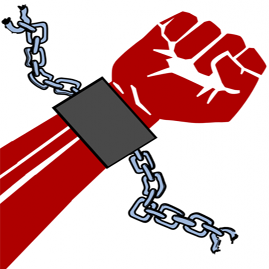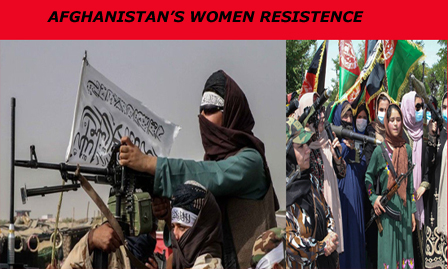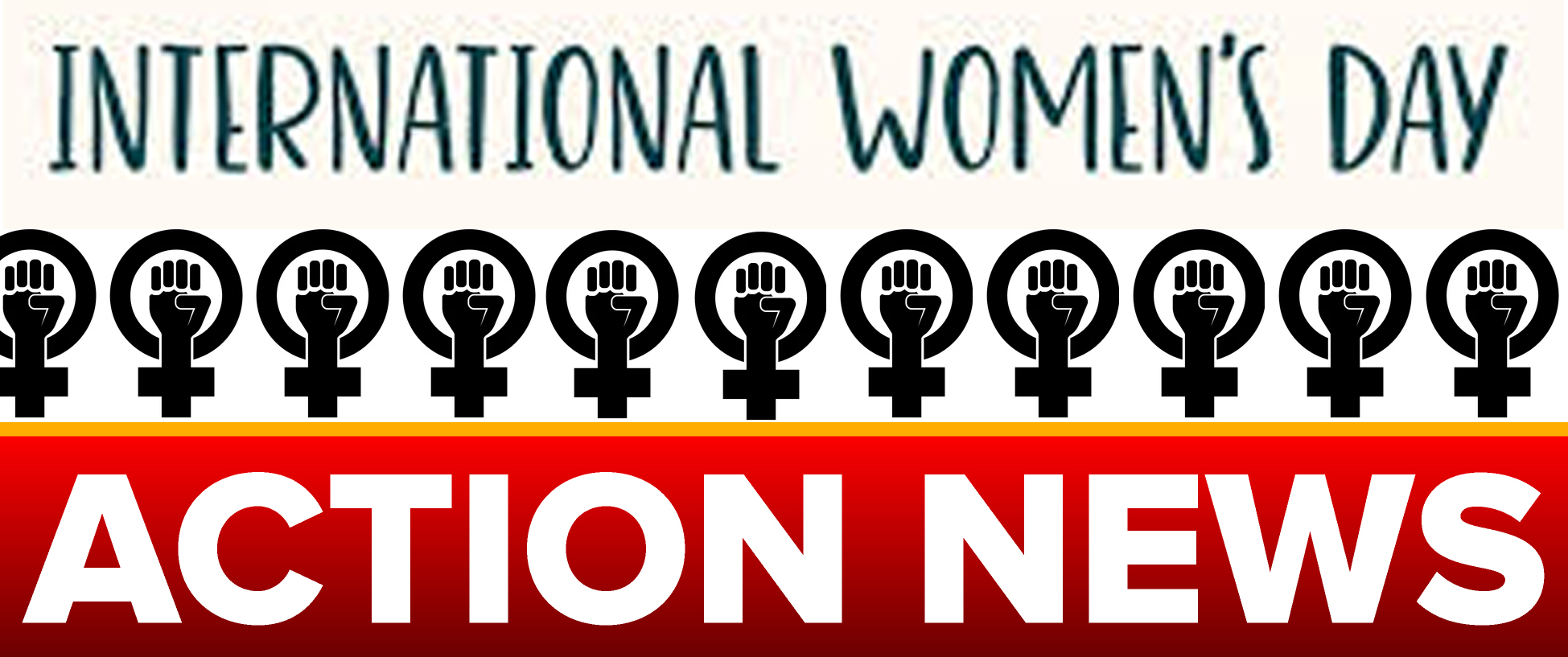| |
CLICK HERE ON HOW TO READ
THE BELOW
When one hurts or kills a women
one hurts or kills hummanity and is an antrocitie.
Gino d'Artali
and: My mother (1931-1997) always said to me <Mi
figlio, non esistono notizie <vecchie> perche puoi imparare qualcosa da
qualsiasi notizia.> Translated: <My son, there is no such thing as so
called 'old' news because you can learn something from any news.>
Gianna d'Artali
30-21 Dec 2021
21-13 Dec 2021 = below
19-13 Dec 2021
11-3 Dec 2021
PAJWOK AFGHAN NEWS
Dec 21 2021
<<‘Eradication of poverty can lead to durable peace’.
FARAH CITY (Pajhwok): A woman, who started a small business after
the fall of the former government in western Farah province, says she no
longer fears the risks of conflicts after peace is ensured in the
country and she hopes for a bright future of her children.
More than four decades of war and insecurity in Afghanistan
forced millions of Afghans to flee their country and hundreds of
thousands have been displaced within the country. Some sources put the
casualty toll at more than a million, while others put it at two
million. As a result of war in Afghanistan, about 4.4 million people
(13.9% of the total population) are disabled and now, more than half of
the country’s population lives below the poverty line.
Rizagul, a resident of Sayedabad village of Farah city, the
provincial capital, said that her husband had joined the army of former
government due to their economic problems. <My husband was a policeman,
it was Ashraf Ghani’s era, his salary was enough to meet our needs and
we did not need the help of others.>
<When my husband was serving in police, we were always in fear
about his death because of war,> she added, saying that her husband lost
his job after the fall of the former government and they had no money to
even buy food.
Rizagul says in the last four months, they crossed the Iranian
border twice but were deported both times. She said her husband was even
forced to commit suicide due to their bad economic situation.
Rizagul burst into tears, saying, <Every morning my husband would
go to town for work, and all the children hoped that my father would
return home with some money, but my husband would return with a confused
and embarrassed face until I myself started working and launched a good
business with little money.>
<I went to our neighbor’s house and borrowed 500 afghanis and
told my son to buy me 250 afghanisof potatoes …. He boiled all the
potatoes that night and until 5am in the morning that, I prepared a lot
of samosas from the cooked potato and told my husband and 12 years old
son to sell them in the city, that was the time when my husband returned
with smiling face,> she said.
She says that now, in addition to selling samosas,she also
prepares and sells vinegar and pickles.
Referring to her little children, Rizagulsaid: <I want our
business to grow, to have a good life so that we can let our children
get education and have a good future, who would be able to work for
themselves and our country.> She said that the government was
responsible for improving the livelihood of people and their economic
situation as well as provide them with educational programs,
particularly for those who are uneducated.>>
Read more here:
https://pajhwok.com/2021/12/22/eradication-of-poverty-can-lead-to-durable-peace/
Al Jazeera
22 Dec 2021
<<UNSC adopts resolution to provide aid to Afghanistan
The resolution says aid will support ‘basic human needs’ and will
not violate sanctions imposed on Taliban-linked entities.
The United Nations Security Council has unanimously adopted a
resolution proposed by the United States that facilitates humanitarian
aid to Afghanistan, which is on the verge of economic collapse, while
keeping funds out of the Taliban hands.
The resolution passed on Wednesday states that <payment of funds,
other financial assets or economic resources, and the provision of goods
and services necessary to ensure the timely delivery of such assistance
or to support such activities are permitted>.
Such assistance supports <basic human needs in Afghanistan> and
is <not a violation> of sanctions imposed on entities linked to the
Taliban, it adds. The international community has struggled over how to
avert a humanitarian catastrophe amid an economic meltdown in
Afghanistan since the Taliban swept back to power in mid-August,
prompting the US to freeze $9.5bn in assets belonging to the Afghan
central bank. An earlier US resolution had sought to authorise
case-by-case exemptions to sanctions, but that was blocked by
veto-wielding permanent Security Council members China and Russia.
<Humanitarian aid and life-saving assistance must be able to
reach the Afghan people without any hindrance,> China’s UN ambassador,
Zhang Jun, said in a tweet on Monday.
The decision to limit the scope of the resolution to one year,
which was not part of the first draft, aims to satisfy Washington’s
European allies, who, like India, had criticised the absence of any
deadline and called for strict control over the destination of aid.
In Afghanistan, aid workers may be involved in financial
transactions with ministries headed by sanctioned individuals. The
resolution ensures that the aid workers are not violating sanctions.>>
Read more here:
https://www.aljazeera.com/news/2021/12/22/un-security-council-afghanistan-aid-resolution
PAJWOK AFGHAN NEWS
Dec 21 2021
<<Poet calls on people to join hands for eliminating violence.
HERAT CITY (Pajhwok): A poet, who reflects the pain of his
countrymen in poetry, urges people, particularly writers and poets, to
work jointly for peace and elimination of violence in the society.
Afghanistan is a country that had been in war for the last four
decades that claimed the lives of large number of Afghans.
Some reports indicate that about a million people have lost their
lives in conflicts, while large number others have been disabled and
millions have been forced to migrate to other countries.
Despite efforts for bringing peace to the country, wars continued
for four decades under different excuses until four months ago when the
Ashraf Ghani administration collapsed and foreign forces withdrew from
Afghanistan. However, explosions and target attacks which happen
sometimes still take the lives of some people.
People of different communities have repeatedly raised their
voice for peace in their country.
MaiwandZamani is a nineteen-year-old poet from Herat who, for
many years, in addition to his social activities, has always tried to
raise his voice for peace in the country through his poetry.
In an interview with Pajhwok Afghan News, he said, <I cannot bear
the suffering of the people and I consider poetry to be the only
solution to express their suffering.>
According to reports, 19 people were killed and 22 others were
wounded, all of them students and civil servants of the university, in
an armed attack in Herat city on November 3.
Zamani reminds the attack in which a father lost a son who did
not respond to his father’s141 missed calls. “O your father’s beloved,
where are you?” was a message attributed to the father that went viral
on social media.
Zamani says, <When I heard about this incident, I shouted, (O
your father’s beloved, where are you), and a few lines of poems were
what I could write about this incident.> >>
Read more here:
https://pajhwok.com/2021/12/21/poet-calls-on-people-to-join-hands-for-eliminating-violence/
Note from Gino d'Artali: I am a poet myself (and visual artist)
and with cryfreedom.net investigating the atrocities against women
worldwide I most likely will write a new poem about it so there's more
to come.
Al Jazeera
21 Dec 2021
<<From: The Stream
Why 2021 was defined by resilient women.
At the Stream, we work hard every year to ensure their
achievements are highlighted. Last year, we renewed our pledge to never
again complete a calendar year without at least 50 percent of our guests
being women. We’re proud to report that 2021 is the fourth year in a row
we have achieved that goal, with women making up 55.17 percent and men
44.8 percent of our more than 500 panelists.
But, when we look around the media industry, it is clear that too
little is changing, too slowly. Men still dominate television news
shows, all-male panels haven’t gone away, and too many in journalism
think a token woman guest is enough. It’s not.
The reason we’re doing this, the reason we do this every year, is
because we believe that journalism can only be truly effective when it
is representative and reflects the societies it covers.
UN Secretary-General António Guterres this year said: “COVID-19
is a crisis with a woman’s face.” And, indeed, there are few global
crises of the sort we habitually cover at Al Jazeera that don’t
disproportionately impact women.
Globally, the loss of jobs due to Covid-19 cost women at least
$800 billion in earnings, a figure larger than the combined GDP of 98
countries, according to Oxfam International. In the United States and
elsewhere, this has taken an especially heavy toll on women of colour.
As we move into the third year of the pandemic, how can economies
recover from the loss of female workers? How can women recover from the
loss of income? We’ll ask these questions in this episode.
Another major story of 2021 in which women were front and centre:
Afghanistan. The Taliban has been under pressure to uphold women’s
rights since they took power in August. Early this month, its leaders
issued a “special decree” outlining women’s rights.
It outlawed child marriage, but did not mention access to jobs or
education. In this show, we’ll look at why some women’s rights leaders
have stayed in Afghanistan to fight for their rights, and talk about why
giving them a seat at the negotiating table is more important than ever.
The biggest story of our time? Climate change. And that is another
crisis with a woman’s face. Women and girls around the world suffer
disproportionately from the impacts of the climate disaster because they
are on average poorer, less educated and more dependent on subsistence
farming.
A UN report in 2017 found that 80 percent of those displaced by
the climate emergency are women. At the Cop26 Climate Conference earlier
this year climate tsar Alok Sharma said: <We know from our efforts to
tackle climate change that it is more effective when we put women and
girls at the heart of those efforts.>
In this episode, we’ll talk about why women are vital to saving
the planet. Join us for this special edition of The Stream.
In this episode of The Stream, we are joined by:
Pashtana Durrani, Director, LEARN Afghanistan
Nisreen Elsaim,
Chair of UN Secretary General’s Youth Advisory Group on Climate
Change
Martha Ross,
Senior Fellow, Brookings Metro
Read more here:
https://www.aljazeera.com/program/the-stream/2021/12/21/why-2021-was-defined-by-resilient-women
Al Jazeera
21 Dec 2021
By Amanda Coakley
<<LONG READ
Features
Refugees
The Albanian tourist town that welcomed Afghan refugees
Amid the kitsch hotels and eerie off-season silence, a new
community is adjusting to life outside their homeland.
Shengjin, Albania – It was a typical August morning in the
popular Albanian tourist town of Shengjin. Nestled in the country’s
north close to the border with Montenegro, the town’s bland-looking
apartment blocks and kitsch hotels were heaving with families scrambling
to make their way to the 6km (4 miles) golden beach perched on their
doorstep. The flurry of activity – parents in bathing suits stuffing
towels into beach bags, children holding decorative inflatable toys
screaming for attention – caught Ziagul Hzimi by surprise. The
27-year-old had just stepped off a plane from Afghanistan, the land of
her birth, after the Taliban entered the capital Kabul and took control
of the country and its 40 million inhabitants.
There she was, still in shock after fleeing her homeland,
standing in the middle of crowds of people whose main concern was
securing the best sun lounger. <Seeing all these Albanians picking up
their belongings and rushing to the beach reminded me of the Kabul
evacuation,> she recalled with a nervous laugh. <I’d never heard of
Albania before I got here in August so it was all a bit of a shock.>
A petite woman with striking features, Ziagul is a journalist who
worked for years in the western Afghan city of Herat. Although she
received no direct threat from the Taliban, she believed there was no
way her safety could be ensured once they were in control of the
country. So, with the help of an American NGO that supported her work,
she boarded an early evacuation flight from Kabul and ended up in
Shengjin to wait for her visa to the United States.
She is staying at the Rafaelo Resort in the centre of town with
about 1,000 other Afghans who also left Taliban-controlled Afghanistan.
Known as 'The Rafaelo', the austere hotel is centred around three small
swimming pools and an odd replica of the Statue of Liberty. It is a
peculiar place with a textbook definition of <luxury>. The apartments
and communal dining area are immaculate but uninspired and cold. The
hedges are delicately cut but stiff. It is a world away from the warmth
that pours from every Afghan home.
Normally booked by well-to-do Albanians during the summer high
season and by businesspeople for conferences during the rest of the
year, the hotel has been taken over by Western NGOs which needed safe
shelter for their Afghan colleagues and their families.
Although the people staying in Shengjin have been referred to as
“luxury refugees”, the sense of loss here is palpable. The young
children scurry around but nearly all the adults look a little lost.
Their bodies may be in The Rafaelo but their hearts are in Afghanistan.
When Al Jazeera visited Shengjin in early autumn, the tourists
had gone and the town was eerily quiet. Most restaurants along the one
main road had closed their doors until next summer. The sun loungers had
been put into storage and the beach was empty.
At The Rafaelo the refugees’ days are filled with endless
waiting. Waiting for news from Afghanistan. Waiting for news about the
next step in their visa application process. The people in this place
have gone from feeling in control of their lives to being at the mercy
of others.>>
Read more here:
https://www.aljazeera.com/features/2021/12/21/the-albanian-tourist-town-that-welcomed-afghan-refugees
Al Jazeera
21 Dec 2021
<<Humanitarian Crises
‘Let us eat’: Afghan protesters call for release of frozen assets
Hundreds of protesters march towards shuttered US embassy,
calling for the release of Afghan assets, frozen since the Taliban took
power.
Hundreds of protesters have marched through the streets of Kabul
towards the shuttered United States’ embassy, urging the release of
Afghanistan’s frozen assets. Holding banners reading, <Let us eat> and
<Give us our frozen money>, the protesters chanted slogans and marched
down a central avenue on Tuesday, with the ruling Taliban providing
security.
International funding to Afghanistan has been suspended and
billions of dollars of the country’s assets abroad, mostly in the US,
were frozen after the Taliban took control of the country in August.
The lack of funding has battered Afghanistan’s already troubled
economy, leading to increasing poverty while aid groups warn of a
looming humanitarian catastrophe.
State employees, from doctors to teachers and administrative
civil servants, have not been paid in months. Banks, meanwhile, have
restricted how much money account holders can withdraw.>>
Read more here:
https://www.aljazeera.com/news/2021/12/21/afghanistan-protesters-kabul-release-frozen-assets
The Guardian
13 Dec 2021
Global development is supported by
Bill and Melinda Gates Foundation
By Peter Beaumont
<<Global development
Afghan health system ‘close to collapse due to sanctions on
Taliban’
Health experts issue dire warning as staff go unpaid and medical
facilities lack basic items to treat patients.
Large parts of Afghanistan’s health system are on the brink of
collapse because of western sanctions against the Taliban, international
experts have warned, as the country faces outbreaks of disease and an
escalating malnutrition crisis. With the country experiencing a
deepening humanitarian crisis since the Taliban’s seizure of power in
August amid mounting levels of famine and economic collapse, many
medical staff have not been paid for months and health facilities lack
even the most basic items to treat patients.
Dr Paul Spiegel, director of the Center for Humanitarian health
at Johns Hopkins University, said that on a recent five-week trip to the
country he had seen public hospitals – which cater for the most
vulnerable – lacking fuel, drugs, hygiene products and even basic items
such as colostomy bags. He said the Covid-19 responsehad almost ground
to a halt and called for a more nuanced response to western sanctions in
order to avert a deeper public health disaster.
<It’s really bad and it is going to get a lot worse,> Spiegel, a
former chief of public health at the United Nations High Commissioner
for Refugees among other high-profile humanitarian assignments, told the
Guardian.
<There are six simultaneous disease outbreaks: cholera, a massive
measles outbreak, polio, malaria and dengue fever, and that is in
addition to the coronavirus pandemic.>
Some parts of the primary healthcare system were being funded
through a two-decades-old scheme, Spiegel said, but large parts remained
largely unsupported, even as health officials, international
organisations and NGOs have been required to restart programmes on hold
after the Taliban regained control of the country in August.
<I’ve been everywhere during my career. What is shocking is that
you don’t normally have an abrupt halt to everything. The UN
organisations and NGOs supporting healthcare in Afghanistan are not just
dealing with acute emergencies, they’re having to respond to getting the
basics running.> >>
Read more here:
https://www.theguardian.com/global-development/2021/dec/13/afghan-health-system-close-to-collapse-due-to-sanctions-on-taliban
|



